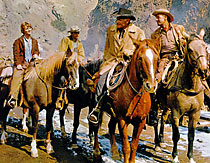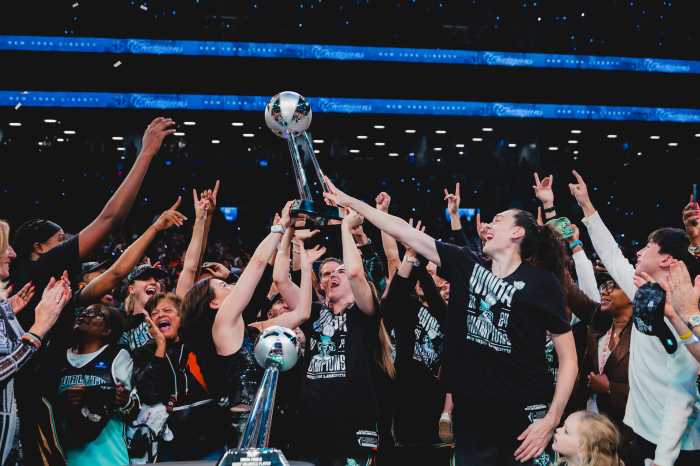Rarely has a film series been more aptly
named.
"Raising Hell: Sam Peckinpah" is the BAMcinematek’s
near-complete retrospective of the equally mesmerizing and maddening
movies of the great, but erratic, American director, Sam Peckinpah.
From his very first films in the early ’60s to his last gasp
at making intensely personal pictures in the corporate Hollywood
environment of the mid-’80s, Peckinpah was much more than merely
the filmmaker who revitalized the moribund western genre with
his influential "The Wild Bunch."
Peckinpah always insisted that he was part Native American –
a fact denied by surviving family members – which surely gave
him an undeniably different interpretation of the legacy of America’s
Old West. No one argues that he wasn’t hard-living: surely his
alcoholism helped lead to his premature death at age 59 in 1984,
and he was often accused of mistreating his colleagues, particularly
women. (The term "misogynist" has been stuck to his
name for decades.)
But, by returning to the films, a more complicated case for Peckinpah’s
life and career can be built. The series opens Aug. 1 with "Ride
the High Country" (1962), Peckinpah’s second feature. Starring
Randolph Scott and Joel McCrea in roles not appreciably different
from the usual larger-than-life lawmen they played throughout
their careers, "Ride the High Country" was the closest
Peckinpah ever came to making a standard Hollywood film. But
even here, he proved that, within the constraints of the Western
genre, he could create top-notch entertainment.
Since Peckinpah, by nature, was volatile and reckless, it’s only
natural that his films are filled with such characters. And simply
because he was an important American director doesn’t mean that
all Peckinpah films are "events." Many seriously flawed
films make up the bulk of his output. "The Getaway"
(1972), which will be screened on Aug. 7, teams then-married
superstars Steve McQueen and Ali MacGraw for a loud, violent
and notably pointless exercise in machismo. "Junior Bonner"
(Aug. 14), Peckinpah and McQueen’s second pairing in the same
year, starred McQueen as a former rodeo star who finds he can’t
go home again.
"Bring Me the Head of Alfredo Garcia" (1974; Aug. 22)
at least gave Warren Oates a colorful leading role, along with
always-photogenic Mexican locations. "The Killer Elite"
(Aug. 21), from 1975, wasted James Caan, Robert Duvall and several
excellent set pieces in a ludicrous film about a renegade CIA-like
organization. And 1970’s "The Ballad of Cable Hogue"
(Aug. 8), while heralding a new, "gentler" Peckinpah,
was really only watchable for Jason Robards’s droll acting.
That leaves the handful of films that underscored Peckinpah’s
reputation as a tough, no-nonsense director who treated his audiences
like mature adults. (His debut, 1961’s "The Deadly Companions";
1965’s "Major Dundee"; and 1978’s "Convoy"
are not included in the BAM series.)
In reverse chronological order: the master’s final film, 1983’s
"The Osterman Weekend" (Aug. 28), was based on a typically
convoluted Robert Ludlum novel; its story of secret surveillance
– abetted by some superbly choreographed action sequences – ensures
its continued timeliness.
Peckinpah’s shocking dramatization of World War II, 1977’s "Cross
of Iron" (Aug. 16), remains one of his most unforgettable
films, shot through with the director’s unique ability to orchestrate
violence as a visually beautiful – but morally queasy – ballet.
After it was re-edited by other hands, 1973’s "Pat Garrett
and Billy the Kid" (Aug. 29) – starring James Coburn, Kris
Kristofferson and Bob Dylan – was considered a disaster. But
a recent re-edit following Peckinpah’s supposed specifications
has resurrected it as an elegant elegy for an Old West irretrievably
lost and forgotten.
That leaves Peckinpah’s two greatest films. "Straw Dogs"
had the misfortune of being released the same year as "A
Clockwork Orange" – 1971 – and many critics who raved about
Kubrick’s ultra-violent film didn’t give Peckinpah the same courtesy.
But this unremittingly bleak drama about a mild-mannered professor
whose basest impulses are triggered by the rape of his wife and
the threats to his own manhood is as revelatory as "Clockwork,"
with an added bonus: the top-notch performances by Dustin Hoffman,
Susan George and David Hemmings as husband, wife and thug, respectively.
No survey of the greatest westerns is complete without "The
Wild Bunch" (Aug. 2). But this seminal 1969 film about a
band of outlaws whose badge of honor is also their ticket to
the grave is far more than a mere genre picture; it is also a
genuine lament for the shoot-’em-up mentality that has plagued
this country for centuries. Pauline Kael summarized its impact
in her review: "Pouring new wine into the bottle of the
Western, Peckinpah explodes the bottle."
Contrary to popular wisdom, Peckinpah never exploited violence
in his films. Although he certainly raised hell, he often did
it far more subtly than he’s given credit for.
"Raising Hell: Sam Peckinpah"
plays Aug. 1-29 at BAMcinematek (30 Lafayette Ave. at Ashland
Place in Fort Greene). Admission is $10 for adults, $7 for students
and seniors. For a complete film schedule, call (718) 636-4100
or visit the web site, www.bam.org.

























